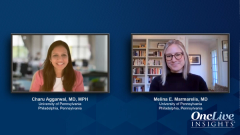
Metastatic NSCLC: Key Challenges in Molecular Testing and Treatment Access
Explore the complexities of limited molecular genotyping availability, the importance of comprehensive testing, and challenges in accessing target therapies, including cost considerations, in real-world clinical practice.
Episodes in this series

Transcript:
Charu Aggarwal, MD, MPH: There are several different scenarios in terms of not just testing but offering treatment. How do you approach the limited [availability] or unavailability of molecular genotyping and testing? What are you doing in real practice?
Melina E. Marmarelis, MD: That is very challenging. If there is no molecular testing available and sometimes this happens, the liquid biopsy doesn’t show us anything, I think we have to proceed as though there is no actionable alteration. Of course, it depends a little bit on the patient—with young patients without smoking histories, I might pursue additional biopsies. It’s never wrong to try to repeat the biopsy in order to get molecular testing, but I also acknowledge that that’s not possible for everybody. So a little bit of what is the positive predictive value of a priority of a biopsy, of finding one of these alterations.
Charu Aggarwal, MD, MPH: And then tell us about limited comprehensiveness. We certainly encountered this where patients outside institutions will get limited panel testing. What do you do in these situations?
Melina E. Marmarelis, MD: If the panel includes just PCR [polymerase chain reaction], for instance, for some of these hotspots, I will repeat the full NGS [next-generation sequencing] and ensure that there’s an RNA portion. And I’ve had several instances where we do actually find something actionable. I think the hotspot testing probably captures a lot, but it does not capture these more rare alterations and some of the RNA fusions as well. So, I will repeat testing, especially if it’s doing a liquid biopsy that they haven’t received. That’s one way to get a more comprehensive look at things.
Charu Aggarwal, MD, MPH: I think it’s important to mention here that it’s important to get gene sequencing. Lately, I’ve seen reports where only IHC [immunohistochemistry] is performed. While IHC may actually be informative, there is no role for EGFR IHC or BRAF IHC or IHC for other surface biomarkers, we really want to see if there is a genetic change, if there is a mutation, if there’s a point mutation or a fusion, and often these events cannot be appreciated with the use of immunohistochemistry assays alone.
In speaking to our audience, I think it’s very important to understand that not all panels are built the same way; the length of the panel matters. But even if it’s a short panel, I don’t want our audience to get discouraged. If it’s a short panel, as long as it’s a good short panel, meaning that’s a gene sequencing fusion panel that covers at least all the actionable biomarkers in lung cancer, that may be adequate, but anything below that we have to be very, very careful. Do you have challenges with the availability of target therapies, Melina? Are you seeing that in clinic, especially as these drugs become more expensive?
Melina E. Marmarelis, MD: Yes, these drugs are very expensive. So we do see challenges, certainly, co-pays can be very high for patients. And depending on where they fall in the income scale, there is mixed availability of assistance programs. Most of the companies that make these drugs have really nice, robust assistance programs, but there are always patients that fall in the middle or just on the border. I do think that cost is a big issue here. And because it’s not an infusion therapy, it’s covered under a different part of their insurance. So they may not have the same types of benefits that somebody who’s receiving an infusional therapy would get.
Charu Aggarwal, MD, MPH: I recently had issues where patients just can’t afford it, or they have met their co-pay max and now they’re able to afford it and vice versa. Definitely, there are a lot of financial challenges, and I encourage everyone to use the financial advocates if they’re available at their institutions.
Transcript edited for clarity.




































